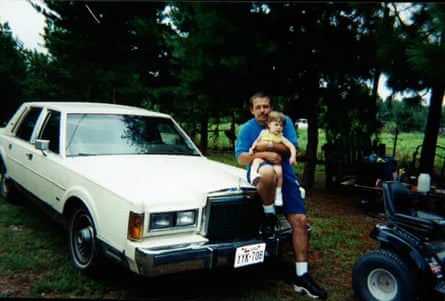Robert Roberson, whom advocates say was wrongfully convicted of killing his two-year-old daughter more than two decades ago, is scheduled to be executed in Texas on Thursday amid claims that his conviction was secured with junk science.
Roberson, 57, brought his daughter Nikki Curtis to hospital in Palestine, Texas, on 31 January 2002. He told doctors that she was ill with fever and had fallen from a bed.
Curtis was “not breathing and had a blue color to her skin”, court documents cited by Time said, and was rushed to another hospital in Dallas, Texas. She was pronounced dead and doctors suspected abuse, finding that her injuries were in keeping with symptoms of shaken baby syndrome.
The syndrome is a condition in which a baby or small child is shaken repeatedly, resulting in their brain hitting the inside of their skull. Medics noted that Roberson was unemotional, further stoking abuse suspicions, and on 1 February 2002, authorities charged Roberson with capital murder.
Shaken baby syndrome is recognized as a real medical condition by health experts. But the American Association of Pediatrics in 2020 said that it had been “misinterpreted” by legal and health authorities. US civilian and military courts have exonerated at least 30 people in shaken baby syndrome cases since 1992, CNN reported.

Roberson’s attorneys contend that his case is among the wrongful convictions related to questionable shaken baby syndrome claims. They insist that his daughter died from double pneumonia that spiraled into sepsis.
They say her dire medical condition worsened still more when she was given medication that is presently considered improper for children. They contend that hospital staff’s immediate shaken baby syndrome determination – which they based on brain swelling and bleeding as well as bruises – amounted to misdiagnosis.
Roberson’s emotionless comportment was not a sign of culpability but rather, due to his autism which was not diagnosed until 2018, his supporters also said. He insisted on his innocence in an interview with CNN.
“It wasn’t a crime committed,” Roberson said. “I was falsely, wrongly convicted of a crime – they said it was a crime, but it wasn’t no crime and stuff because I had a sick little girl, you know?”
Roberson received custody of Curtis two months before her death. He did not know about the girl until she was born, CNN said.
Curtis’s maternal grandparents had custody the majority of her life, but they ultimately agreed that he should have custody. Roberson said that he picked up Curtis from her grandparents’ house and brought her home.
Roberson said he turned on a movie and that they both fell asleep in the same bed. But Roberson said he woke after hearing Curtis’s cries and saw her on the ground.
There was blood on the girl’s lips and a bruise below her chin, which Roberson cleaned up. Roberson said that he stayed awake several hours to make sure the toddler was all right and fell asleep again. In the morning, she was not responsive, CNN quoted him as explaining.
“I carried her to the hospital and stuff, you know,” Roberson told the network. “I didn’t have nothing to hide.”

Roberson’s supporters include the Innocence Project, autism advocacy organizations, a bipartisan cohort of more than 80 lawmakers, as well as the celebrated legal novelist John Grisham, CNN notes. Brian Wharton, who was a detective in Palestine, Texas, is also among his advocates.
“Those two things are playing against each other – the emotional upheaval of the ER staff alongside the father who is just there,” Wharton reportedly said. “And then when you add to that this accusation of shaken baby syndrome, that affirms for you all the emotions you had in the ER and makes that flat affect much more suspect.
“The investigative or the suspicious mind takes over and leads the investigation,” Wharton also told CNN. “Very early on, Robert was the focus of everything to the exclusion of any other possibilities.”
The US supreme court on 2 October declined to hear Roberson’s petition. Roberson has effectively exhausted his state-level appeals in Texas.
Roberson’s lawyers on Tuesday pushed for his death warrant to be found void, reportedly telling a court that the jurist who scheduled this execution lacked proper jurisdiction. But the administrative judge overseeing this proceeding disagreed, saying procedures were followed, meaning the execution remains on schedule, per the Tyler Morning Telegraph.
They have also asked the Texas pardons and parole board and the Republican governor, Greg Abbott, for clemency. Roberson’s lawyers have petitioned for his sentence to be commuted to a lesser punishment or, that he should be given a postponement to allow more time for litigating appeals.
But the board on Tuesday failed to recommend that Abbott grant clemency, Roberson’s lawyers said in a statement. Abbot rarely grants clemency petitions.
If the execution proceeds as scheduled, Roberson will be the first person in this country to be executed related to shaken baby syndrome, the Associated Press reported.
“It is not shocking that the criminal justice system failed Mr. Roberson so badly. What’s shocking is that, so far, the system has been unable to correct itself – when Texas lawmakers recognized the problem with wrongful convictions based on discredited ‘science’ over ten years ago,” Gretchen Sween, one of Mr Roberson’s attorneys, said in a statement.
“We have tried multiple times to utilize that law. Multiple times we have been turned away – without explanation or consideration of the new evidence. We will ask Governor Abbott to issue a 30-day reprieve so we can continue to pursue Mr. Roberson’s innocence claim,” Sween also said. “We pray that Governor Abbott does everything in his power to prevent the tragic, irreversible mistake of executing an innocent man.”
The scheduled execution comes in the wake of Missouri’s execution of Marcellus Williams who, like Roberson, maintained his innocence. Williams, who was Black, was convicted of killing a white woman.
His conviction was rooted in two witnesses who were paid for testifying, according to The Innocence Project. Despite the fact that St Louis prosecutors recognized errors in the case, and that the woman’s husband opposed Williams’s execution, the state’s attorney general and governor refused to grant him clemency.
Ed Pilkington contributed reporting

 9 months ago
9 months ago
 (200 x 200 px).png)








 English (US) ·
English (US) ·